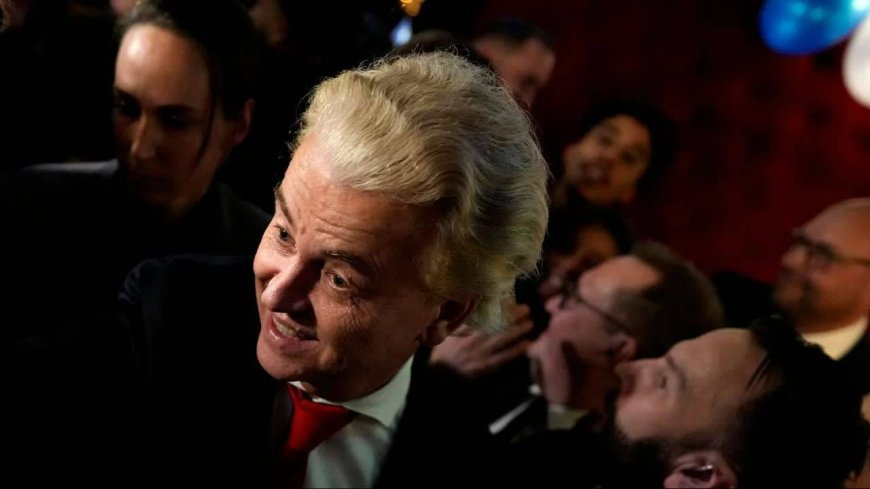Dutch Democracy in Peril: The Netherlands' Election Outcome Rings Alarm Bells for the European Union
In a recent turn of events, the Netherlands witnessed early elections, originally scheduled for 2025, due to significant differences within Prime Minister Mark Rutte's cabinet regarding immigration and Islam policies. This rupture ultimately led to the collapse of the government, necessitating the early elections. The outcome of these elections has been described as a groundbreaking political upheaval, comparable in magnitude to the post-World War II era. Notably, the far-right Party for Freedom (PVV), under the leadership of Geert Wilders, emerged as the frontrunner, securing the largest share of votes and claiming 37 out of the 150 parliamentary seats.

However, it is important to note that forming a government requires a minimum of 76 seats, compelling the PVV to seek a coalition with center-right parties to attain majority representation. Geert Wilders, a 60-year-old Dutch politician, rose to prominence within the Dutch political landscape due to his anti-Islam and anti-immigration stance. Since establishing the Party for Freedom in 2004, Wilders has advocated for controversial policies, including the expulsion of all Muslims from the Netherlands and the closure of mosques. Additionally, he has taken anti-war positions concerning Russia and expressed support for Netanyahu and Israel.
The election results in the Netherlands have laid bare a palpable sense of desperation and disillusionment among the populace towards coalition governments. The surge in interest towards extreme right-wing ideologies can primarily be attributed to the soaring costs of energy and living, exacerbated by the ongoing conflict between Russia and Ukraine. Wilders staunchly opposes the embargo and the provision of weapons to Ukraine, arguing that such assistance should cease, relieving the Dutch people from the burden of war expenses.
Furthermore, these election results have starkly exposed deep divisions among the Dutch population, presenting a formidable challenge for the future government. The question arises as to which group can effectively advocate for the interests of all Dutch citizens. The implications of this dilemma are far-reaching, with the potential to shape the country's political landscape significantly.
In the lead-up to the elections, Geert Wilders adopted a more moderate tone regarding Muslims and immigrants. Even after his party's triumph, he pledged to govern within the framework of the constitution, emphasizing that other pressing priorities such as livelihood and economic improvement should take precedence over decisions impacting Muslims. However, concerns persist among Dutch politicians and human rights activists regarding Wilders' intentions and actions. The Party for Freedom's core principles, rooted in anti-Islam and anti-immigration sentiments, raise fears and anxieties among minorities in the Netherlands, fueling the prospect of political and social polarization within the country.
Prominent leaders from various political parties have cautioned Wilders against exacerbating societal divisions, as a move towards polarization could lead to social unrest and widespread insecurity. The government may find itself ill-equipped to manage the ramifications of such a shift. The concerns expressed by different segments of Dutch society highlight the potential for bitter events to unfold if social and cultural divisions continue to widen.
The outcome of these elections also rings alarm bells for the European Union (EU), signaling that a reevaluation of its economic and social policies is imperative to avert future challenges. Notably, the Party for Freedom has doubled its representation in the Dutch parliament in less than two years. This development carries significant weight, considering that the Netherlands played a pivotal role in the EU's establishment. Wilders' plans to explore the possibility of leaving the European Union underscore a shifting mindset among the Dutch, who, like many citizens in the developed world, increasingly prioritize their own welfare and interests.
Furthermore, the Dutch vote demonstrates the sustained growth of far-right movements, which adeptly exploit public concerns and fears to secure votes through populist slogans. The extreme right has now emerged as a major political force in Europe. The European Union can no longer afford to disregard the needs and demands of these movements, as doing so would only exacerbate divisions and disagreements within the continent. The rise of far-right coalitions, should they gain parliamentary majorities before the European Parliament, has the potential to deepen the rift and even prompt certain countries to consider withdrawal from the union.
It is incumbent upon the European Union to reflect upon its existing processes and undertake necessary reforms to prevent the formation of far-right coalitions while preserving the democratic fabric of the union. Although such reforms may entail significant costs, Europe finds itself with limited alternatives. Consequently, it becomes evident that certain actions taken by European countries over the past few decades, including policies surrounding immigrants and extensive media campaigns against them, as well as explicit anti-Islamic positions, are now yielding unforeseen consequences—a fragmented Europe, rife with factions and laden with challenges.
The rise of the far-right in the Netherlands serves as a stark reminder of the urgent need for introspection and proactive measures to address the concerns and aspirations of Dutch citizens. Failure to do so risks further polarization, both within the country and the European Union, with far-reaching implications for social cohesion, political stability, and democratic values.













































